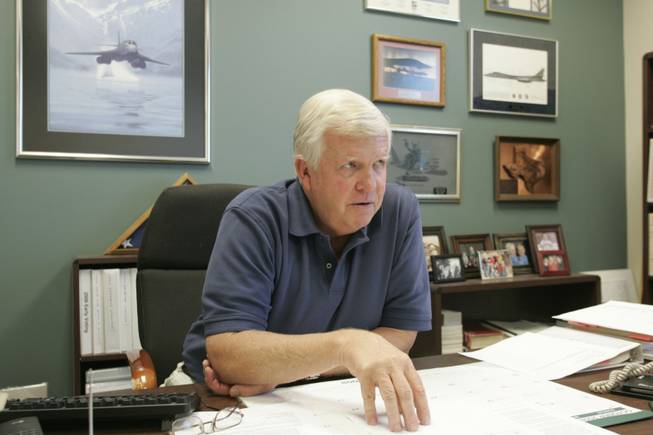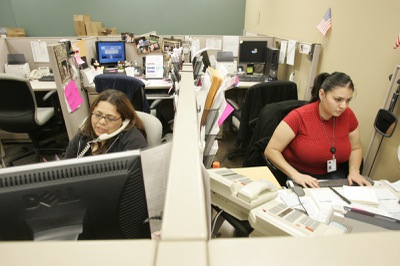
Clark County Registrar of Voters Larry Lomax talks Thursday about a newspaper article and its assertion that voter registration cards were not being processed properly.
Sunday, Oct. 12, 2008 | 2 a.m.
In Today's Sun
Sun Archives
- Gibbons, Gansert care deeply about voter verification (10-9-2008)
- Corrections department unaware of potential voter fraud (10-9-2008)
- Fraud probe worries champions of black vote (10-8-2008)
- Nevada political roundup: GOP pushes for photo ID voting bill (10-7-2008)
- Las Vegas office raided in voter fraud case (10-7-2008)
Becoming a Nevada Voter, from Registration to the Polling Place
STEP ONE: The applicant fills out a registration form that requests information such as their address, date of birth and party affiliation – as well as his Nevada Driver’s License number or the last four digits of his social security number, to make sure the applicant is who he says he is.
STEP TWO: The registration form is sent to the applicant’s county registrar of voters.
STEP THREE: If the registrar believes any part of the application is fraudulent or intentionally false, it is sent to a division of the Secretary of State’s office, the Nevada Election Integrity Task Force, for review.
STEP FOUR: All other registration forms are entered into the statewide voter registration system. If the applicant gives his driver’s license number, but it can’t be verified by the Department of Motor Vehicles, the application is automatically sent to the Social Security Administration to verify the person is who he says. Likewise, if the applicant lists the last four digits of his Social Security number, that number is sent to the Social Security Administration for verification.
STEP FIVE: If both numbers or the social security number alone comes back to the registrar as “unmatched,” the county clerk’s office sends a letter to the applicant, requesting that he correct the information.
STEP SIX: If the clerk doesn’t receive a response within 15 days, the applicant will still be allowed to vote if he presents some valid form of identification at the polling place. As per state law, this can include a driver’s license, a college ID or even a utility bill.
STEP SEVEN: Days before the election, county registrars compile a final “poll book” with the names of all eligible voters, which must match the official statewide voter database. The pertinent lists of voter names are then shipped to each neighborhood polling place.
STEP EIGHT: On election day, the voter presents himself at his designated polling place and signs his name in the poll book or, if necessary, presents proof of identity.
Sources: Las Vegas Sun, Nevada Secretary of State‚s office and the Clark County Election Department.
Early voting begins this week in Nevada and anxious voters may have reason to wonder whether they can trust the outcome.
Presidential election balloting was a mess in Florida eight years ago and again in Ohio in 2004.
And this month, the Nevada secretary of state responded to allegations of widespread voter registration fraud, and a top federal official claimed the state mishandled efforts to confirm newly registered voters’ identities.
Should voters be concerned about their votes’ integrity?
Nevada and Clark County election officials say the system is working as designed and that recent controversies have been overblown.
“We do a better job at protecting our voter rolls than any other state,” Nevada Secretary of State Ross Miller said. “I can say unequivocally that on Nov. 5, we’ll be able to say that we ran an honest election here.”
Miller was alerted to federal concern about Nevada’s practices in an Oct. 3 letter from Social Security Commissioner Michael Astrue.
The letter, similar to ones sent the same day to election officials in five other states, expressed concern about the number of requests the agency received from Nevada to verify Social Security numbers on voter registration applications.
“Such a volume appears to be much greater than one would expect,” Astrue wrote, “given that states of comparable or larger populations have a significantly lower number of verification requests.”
Astrue said Nevada sent about 744,000 such requests to the agency during a recent one-year period.
According to the Social Security Administration, about 716,000 of those requests resulted in “nonmatches,” meaning that no person matched the Social Security number listed.
According to a 2002 law called the Help America Vote Act, state election officials need to do everything they can to verify identities of voter applicants through state databases such as those that issue driver’s licenses. The Social Security Administration database — thought to be less reliable than the state lists — is only supposed to be used in cases where state databases cannot help.
Nevada officials claim the federal agency has exaggerated the number, though they could not say precisely how many verification requests were passed on to the Social Security Administration.
In an interview, Clark County Registrar of Voters Larry Lomax provided data showing that the county — which makes up 70 percent of Nevada’s population — had received about 331,000 new voter registration applications from Jan. 1 through last week.
Taking into account the facts that the year isn’t over and that Clark County does not comprise the whole state, the Social Security Administration’s claim of 716,000 unmatched names seems unsupportable.
Lomax also disputed a New York Times story on the issue, which reported that errors likely stemmed from county clerks incorrectly inputting data.
Misstating the problems, Lomax said, “only undermines people’s confidence the process.”
In fact, Social Security numbers are not supposed to have much of a role in registering voters.
Voter applicants are instructed on registration forms to supply Nevada driver’s license numbers for verification. Only in those cases where applicants don’t have driver’s licenses should they, then, provide the last four digits of their Social Security numbers.
When the county registrar receives applications, clerks inputs them into the state’s computer system. There is just one line to input either the driver’s license number or partial Social Security number.
In a news release, Miller responded to Astrue’s concerns and the resulting Times article — which insinuated that Nevada was purging hundreds of thousands of voters from its rolls — by noting that eligible voters whose records were unmatched by the Social Security Administration still appear on the rolls. Those voters need to show identification at polling places if they haven’t cleared up the mistake with election officials.
“Any suggestion that eligible voters will be denied their right to participate in election on Nov. 4 is false,” Miller wrote.
The flap between Nevada officials and the Social Security Administration wasn’t the biggest election-related scandal to hit the state this election season.
Last week state investigators raided the Las Vegas offices of the nonprofit Association of Community Organizations for Reform Now, known as ACORN.
State officials alleged that paid ACORN voter registration canvassers engaged in fraud by completing some registration forms with nonexistent addresses or false names — including some with the names of Dallas Cowboys football players — and that they also had used the same names in several other applications.
According to the affidavit filed with the search warrant, one canvasser admitted that she had submitted 40 voter registration forms to her supervisor — and that only 10 of them were authentic.
The canvasser told officials she was having trouble meeting the ACORN requirement of 20 completed applications per day.
Charles Jackson, an ACORN spokesman, said that his group makes strong efforts at quality control by double-checking each new voter registration form handed in by canvassers. He said ACORN is diligent about reporting suspected fraud to the proper authorities.
ACORN does not issue a minimum number of forms its canvassers need to hand in daily, despite what the canvasser quoted in the affidavit claimed, he said.
Even if fraudulent registrations are turned in by organizations, they are flagged by registrars when the names can’t be reconciled by their driver’s license or Social Security numbers. If the matter isn’t resolved, the names remain on the voting rolls but those people must show positive identification before being allowed to vote.
Given that Nevada likely will be one of most closely contested states in an up-for-grabs presidential election, can residents be sure that process is sound?
UNLV Boyd School of Law Professor Sylvia Lazos said the answer, most likely, is yes.
“The stuff in the news (regarding ACORN) is a very, very small percentage of new registrations,” she said. While fraudulent voter registration applications are rare, the make people “very upset.”
The larger problem, she said, is the possibility of voter suppression, especially as it relates to new voters and college students, who don’t always have identification that might be needed at a polling place.
“We need to make voting more available and accessible,” she said.
As of September, there were 1,395,484 registered voters in Nevada, according to the secretary of state’s office, including 959,079 in Clark County.


Join the Discussion:
Check this out for a full explanation of our conversion to the LiveFyre commenting system and instructions on how to sign up for an account.
Full comments policy